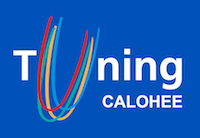
Unibo structure involved: Department of History and Cultures – DiSCi
Scientific manager: Carla Salvaterra
Unibo Team: Giuseppe Cecere, Nicoletta Celli, Alessandro Cristofori, Gaia Fanelli, Licia Proserpio, Francesca Roversi Monaco
Project Web page: https://www.calohee.eu
Erasmus+ Action type: Forward Looking Cooperation Projects
Project reference: 612892-EPP-1-2019-1-NL-EPPKA3-PI-FORWARD
Start Date: 1 January 2020
End Date: 31 December 2021
Budget: Total: € 500,000 UNIBO: € 9,750
Coordinator: RIJKSUNIVERSITEIT GRONINGEN (NL)
Partners:
RESEAU DES UNIVERSITES DES CAPITALES DE L'EUROPE (BE)
UTRECHT NETWORK (NL);
EUROPEAN CONSORTIUM FOR ACCREDITATION IN HIGHER EDUCATION (NL)
ASSOCIATION EUROPEENNE D'INSTITUTIONS DE L'ENSEIGNEMENT SUPERIEUR (BE)
STICHTING NUFFIC (NL)
GRUPO SANTANDER (ES)
GRUPO COMPOSTELA DE UNIVERSIDADES (ES)
EUROPEAN ALLIANCE FOR SUBJECT-SPECIFIC AND PROFESSIONAL (BE)
ACCREDITATIONAND QUALITY ASSURANCE EV (DE)
EUROPEAN STUDENTS’ UNION (BE)
HASKOLI ISLANDS (IS)
VILNIAUS UNIVERSITETAS (LT)
UNIVERSIDAD AUTONOMA DE MADRID (ES)
ALMA MATER STUDIORUM – UNIVERSITÀ DI BOLOGNA (IT)
PARIS-LODRON-UNIVERSITÄT SALZBURG (AT)
UPPSALA UNIVERSITET (SE)
UNIVERSITÀ DEGLI STUDI DI PADOVA (IT)
STICHTING KATHOLIEKE UNIVERSITEIT (NL)
HARIDUS-JA TEADUS MINISTEERIUM (EE)
UNIVERSIDAD DE GRANADA (ES)
HELSINGIN YLIOPISTO (FI)
KOBENHAVNS UNIVERSITET (DK)
TAMPEREEN KORKEAKOULUSAATIO SR (FI)
ROYAL COLLEGE OF SURGEONS IN IRELAND (IE)
ODISEE (BE)
UNIVERZA V MARIBORU (SI)
UNIVERSITÀ CAMPUS BIO MEDICO DI ROMA (IT)
UNIVERSIDADE DO PORTO (PT)
WATERFORD INSTITUTE OF TECHNOLOGY (IE)
UNIVERSITÀ DEGLI STUDI DI SALERNO (IT)
ARISTOTELIO PANEPISTIMIO THESSALONIKIS (EL)
MIDDLE EAST TECHNICAL UNIVERSITY (TR)
SVEUCILISTE U ZAGREBU (HR)
UNIVERSITE DE MONTPELLIER (FR)
UNIWERSYTET WARSZAWSKI (PL)
EDUCACION PARA UN MUNDO INTERDEPENDIENTE-EDUCATION POUR UN MONDE INTERDEPENDANT-EDUCATION IN AN INTERDEPENDENT WORLD (BE)
SZEGEDI TUDOMANYEGYETEM (HU)
THE PROVOST, FELLOWS, FOUNDATION SCHOLARS & THE OTHER MEMBERS OF BOARD OF THE COLLEGE OF THE HOLY & UNDIVIDED TRINITY OF QUEEN ELIZABETH NEAR DUBLIN (IE)
UNIVERSITA TA MALTA (MT)
COIMBRA GROUP ASBL (BE)
UNIVERSIDAD DE LA IGLESIA DE DEUSTO ENTIDAD RELIGIOSA (ES)
UNIVERSITEIT GENT (BE)
Summary:
The Measuring and Comparing Achievements of Learning Outcomes in Higher Education in Europe (CALOHEE) II project is a follow-up of the CALOHEE project (2016-2018): (https://www.calohee.eu), which has developed highly sophisticated European Qualifications Reference Frameworks and Assessment Reference Frameworks for five key subject areas, representing as many HE sectors. These Frameworks allow for defining what a relevant and high quality degree programme should entail. Based on a merger of the EQF for LLL and the QF for the EHEA it gives clear indicators for three succeeding levels of learning for both the first and the second cycle. It is therefore unique in its kind and highly innovative. The aim of this CALOHEE II project is twofold: (1) matching the frameworks against existing degree programmes and quality assurance systems, procedures and practices. The exercise will offer in-depth knowledge on the present and intended future learning outcomes of degree programmes, but also offer insight into the present learning, training and assessment situations. It will highlight present omissions in degree programmes Europe-wide. This is of importance for individual HE institutions, but also very relevant for policy-makers in education and training at all levels, including national and European levels.(2) developing - on the basis of the frameworks - an applicable and fair instrument to measure performance at the end of first cycle studies. This requires the development (and initial testing) of a test blueprint/ test items bank which allows for bridging different cultural, disciplinary and educational specificities of national and local entities. It should also allow for differences in profiles and missions and variation in level to be achieved. It should result in an additional instrument to define whether intended learning as defined by the frameworks is achieved. Frameworks and test blueprints will also result in better evidenced QA mechanisms.
